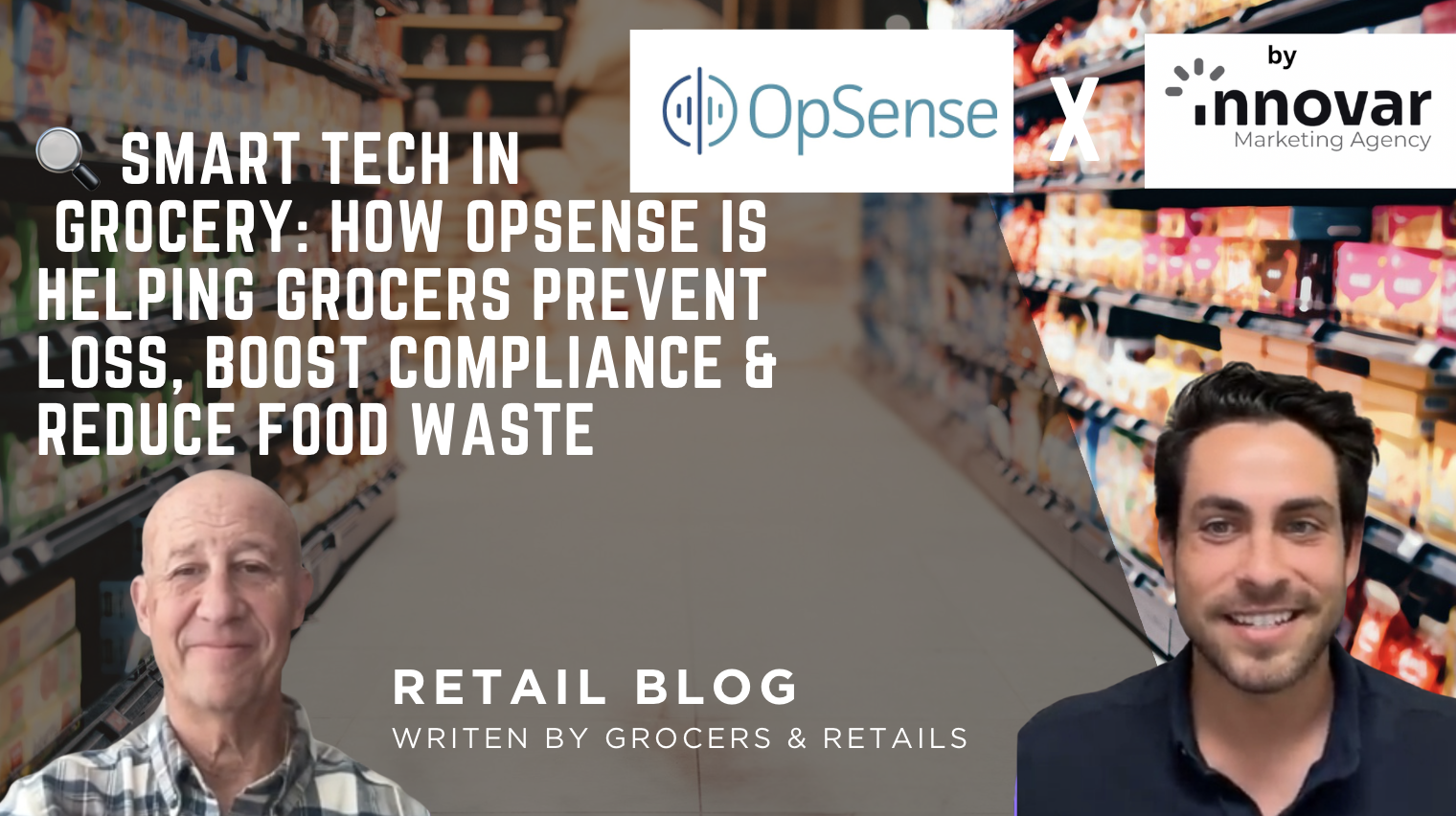🔍 Smart Tech in Grocery: How OpSense Is Helping Grocers Prevent Loss, Boost Compliance & Reduce Food Waste
By George Goodwin | Innovar Marketing Agency | August 6th, 2025
🚀 Introduction: The Hidden Cost of Broken Cold Chains
In today’s high-stakes grocery and CPG landscape, one faulty freezer, one missed temperature check, or one hour of power outage can cost thousands—and your brand’s reputation.
What if that could be prevented in real time?
In our latest episode of the GroceryPulse Podcast, we sat down with Stu Gavurin, Founder and CEO of OpSense, a platform that’s making food safety smarter, more scalable, and more human-centered.
With a SaaS product that bridges IoT sensors, digital task management, and operational insight, OpSense isn’t just helping businesses track temperature—it’s helping them build trust, reduce waste, and unlock new levels of operational efficiency.
Listen to the full Grocery Pulse podcast interview with OpSense CEO Stuart Gavurin below, or find it on Apple Podcasts.
🧠 Episode Breakdown: Lessons from the Front Lines of Food Safety
🔹 1. Why Food Waste is a $218 Billion Opportunity
According to ReFED, $218B in food is wasted annually in the U.S.
Grocery stores alone account for 10% of all food waste, much of it due to spoilage from poor temp management.
“Spoilage isn’t just loss—it’s leakage in customer trust, P&L, and sustainability goals,” says Gavurin.
🔹 2. How OpSense Transforms Monitoring into Action
Stu’s team has decades of software experience, including working with Kroger. OpSense was built to address real operational bottlenecks.
“We’re hardware agnostic. We price by location. We want grocers to monitor as much as possible—not worry about nickel-and-dime fees.” – Stu Gavurin
Key Features:
Real-time temperature & humidity monitoring via IoT sensors
Automated alerts and escalation
Digital checklists and task assignment
API integrations with ERP and compliance platforms
Result: Grocers get instant visibility and can act before food safety is compromised.
🔹 3. What Makes OpSense Different?
Location-based pricing: No per-user or per-sensor fees
Built-in digital task management: Assign tasks, follow up, and track completion
Hardware flexibility: Choose best sensors for the job, no lock-in
“One customer told us OpSense completely revolutionized how they manage their distribution centers.”
🔹 4. Why Real-Time Tech is the Future of Food Ops
Consumer trust is fragile. Recalls and reviews travel fast.
Compliance is now a brand value, not just a regulation.
In the next 5 years, expect:
AI-driven anomaly detection
Connected kitchens & digital audits
Automated cold chain verification from supplier to shelf
Stat: By 2030, the global food safety tech market will exceed $32.7 billion, growing at nearly 8% CAGR (MarketsandMarkets, 2024)
🎧 Listen to the full episode:
👉 Transforming Grocery Operations with Smart Technology | GroceryPulse Podcast
🔑 Key Takeaways
Food waste is a billion-dollar problem. The U.S. loses over $218 billion in food waste annually — more than the GDP of Portugal.
Prevention is profit. OpSense users have reported saving $15K–$200K+ in lost product, labor, and equipment downtime.
Independents are leading the way. Mid-size and independent grocers are adopting smart monitoring tools faster than corporate chains.
“Saves” > “Losses.” Track and celebrate the dollars you didn’t lose — that’s where tech ROI shines.
Data makes operations scalable. With just 2+ stores, it becomes harder to manage risk manually. Tools like OpSense simplify oversight.
Automation gives teams time back. Employees can focus on customer service instead of temperature logs and equipment checks.
Smart tech doesn’t have to be intimidating. Tech should feel like a helpful coworker — not a complex new system.
Retailers need tools that integrate into workflows—not add complexity.
Legacy systems cost more in missed insights than new systems cost to install.
Customer trust is now tied to back-of-house performance.
Food safety tech is a growth lever, not just risk management.
Food waste is solvable—but only with real-time, actionable data.
❓ Frequently Asked Questions (FAQ)
Q: What is OpSense?
A: A cloud-based monitoring platform that connects to sensors in your store — tracking refrigeration, prepared foods, and compliance in real time.
Q: Who should use OpSense?
A: Multi-location grocers, regional chains, and foodservice operators — especially those managing 3+ stores and looking to streamline operations.
Q: What does it cost?
A: It's affordable for independents and mid-sized operators. OpSense uses low-cost sensors and doesn’t require complex IT setup.
Q: How quickly will I see ROI?
A: Some stores report seeing ROI in as little as two months through product saves, energy reduction, and fewer emergency maintenance calls.
Q: What are “saves”?
A: “Saves” are measurable financial wins — like preventing product loss or catching equipment failure early — that protect profitability.
✅ Conclusion
Most grocery losses don’t happen at the register — they happen when food spoils, equipment fails, or processes break down.
OpSense brings smart monitoring and real-time insights to store teams, empowering them to act before a small issue becomes a major loss. This episode is a powerful reminder that tech investments aren’t just about speed and sales — they’re about sustainability, efficiency, and peace of mind.
If you manage multiple stores or want to avoid “I told you so” losses, this conversation is for you.
📣 Learn More or Connect
Interested in how smart tech can help your grocery operation thrive?
📬 Contact the Innovar team: marketing@innovaragency.com
📩 Alternate email: marketing@innovarmarketing.com
🔗 Visit OpSense: www.opsense.com
💼 Connect with Stu Gavurin: linkedin.com/in/stugavurin
📎 Schedule a Free Strategy Call with Innovar
👤 Connect with George: linkedin.com/in/number-one-marketer
🛒 About This Episode
In this episode of GroceryPulse, host George Goodwin sits down with Stu Gavurin, founder and CEO of OpSense, a smart food safety and monitoring platform designed for retailers who need real-time insight into refrigeration, compliance, and operational risk — without the big enterprise price tag.
Whether you're a single-store operator or managing a growing chain, this conversation will reshape how you think about food safety, waste, and the power of data-driven operations.


